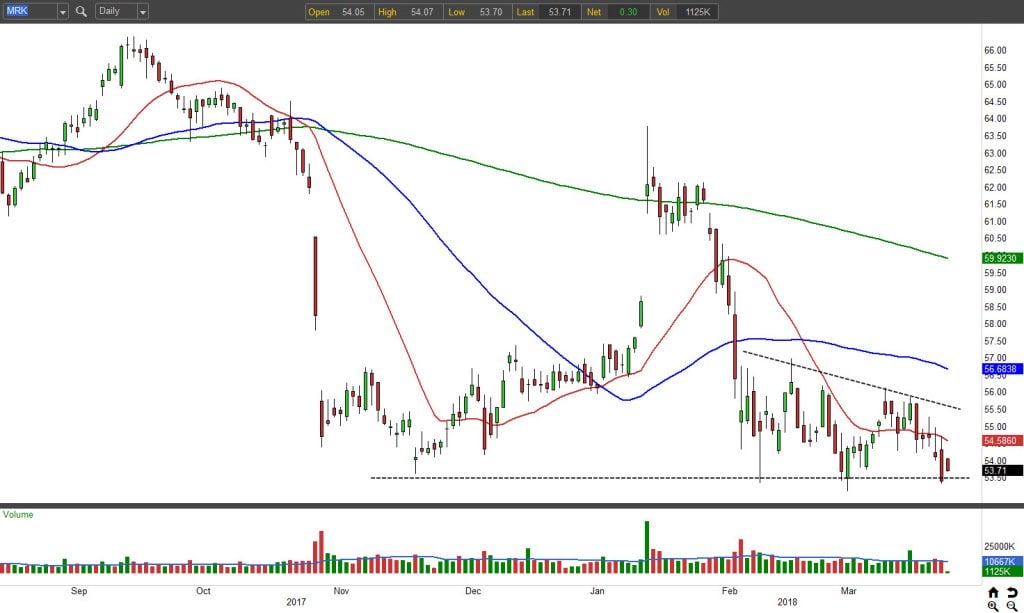Shares of Merck (NYSE:MRK) stock remain 12% below where they started the year, while the value of other drug companies have soared.

While Merck is one of the most respected drug makers out there, it was seen to be behind the curve when it comes to the novel coronavirus.
It is now playing catch-up. Merck’s overseas arm, called MSD, bought Themis Bioscience and its vaccine technology in the spring. It has now bought a Covid-19 therapeutic maker, called OncoImmune, for $425 million.
The good news, for Merck, is that while Covid-19 is the first coronavirus to become pandemic, it won’t be the last.
The Corona Truth
Covid-19 is not the first coronavirus to be transmitted to people. It’s related to the severe acute respiratory syndrome (SARS) that hit in 2003, and the Middle East respiratory syndrome (MERS) that struck in 2012. Remdesivir, the Covid-19 monoclonal antibody that has been such a hit for Regeneron Pharmaceuticals (NASDAQ:REGN), was originally created to treat the Ebola virus disease.
Covid-19 is a zoonotic disease, shared by animals and humans. Scientists expect these to become more common, because people now live in mega-cities that are intimately connected. The connections of modern civilization are a recipe for mass spreading of viral contagion.
The Obama administration’s pandemic playbook to fight such diseases is likely to be re-animated by the Biden administration. The failures against the current pandemic were too obvious.
Corporations like Merck are now hustling to get into position so that when the next pandemic hits, they will be ready.
Meanwhile, CEO Ken Frazier, who agreed to stay on past his 65th birthday last year, is trying to moderate expectations for the first Covid-19 vaccines. He says they aren’t a “silver bullet,” and that masks will be required through most of 2021. Merck now has two of its own Covid-19 vaccines in development, one from Themis and one designed by the International AIDS Vaccine Institute, a non-profit.
Merck Beyond Covid-19
Merck is making moves beyond Covid-19.
It is spinning out its older drugs as Organon, and funding research into new drugs that either turn off or turn on the immune system.
Its biggest drug today is Keytruda, which augments the immune system against cancer. That’s expected to be a $22.5 billion business in 2025.
MRK stock gained nearly $4 billion on its OncoImmune buy, a 10-1 premium over the purchase price. It’s the company’s second buy in a month. Earlier it paid $2.75 billion for VelosBio, whose cancer drug targets a Tyrosine Kinase receptor called ROR-1. That drug is still in early trials.
While MRK stock is paying its 65 cents per share dividend in January, its new strategy contains risk. As with Pfizer’s (NYSE:PFE) spinoff of Viatris (NASDAQ:VTRS), which is down $1 per share since it began trading Nov. 17, the idea is separate the company’s past from its future.
The Bottom Line For MRK Stock
Merck has been considered a conservative pharma investment, but that phrase has lost its meaning.
By spinning off older drugs with expired patent protection, all drug companies are now in the same boat. They’re depending on their scientists, cash and research budgets, to find new blockbusters. In this way they’re like the oil wildcatters of 100 years ago.
Unlike some of its rivals, however, Merck already has a gusher with Keytruda. It can exploit that beachhead, like an oil company that has found a big field. It can use the cash to buy other wildcatters, companies like Themis and OncoImmune that have promising drugs or just new approaches.
The swashbuckling era in biochemistry has just begun.
On the date of publication, Dana Blankenhorn did not have (either directly or indirectly) any positions in any of the securities mentioned in this article.
Dana Blankenhorn has been a financial and technology journalist since 1978. He is the author of the environmental thriller Bridget O’Flynn and the Bear, available at the Amazon Kindle store. Write him at [email protected] or follow him on Twitter at @danablankenhorn.
